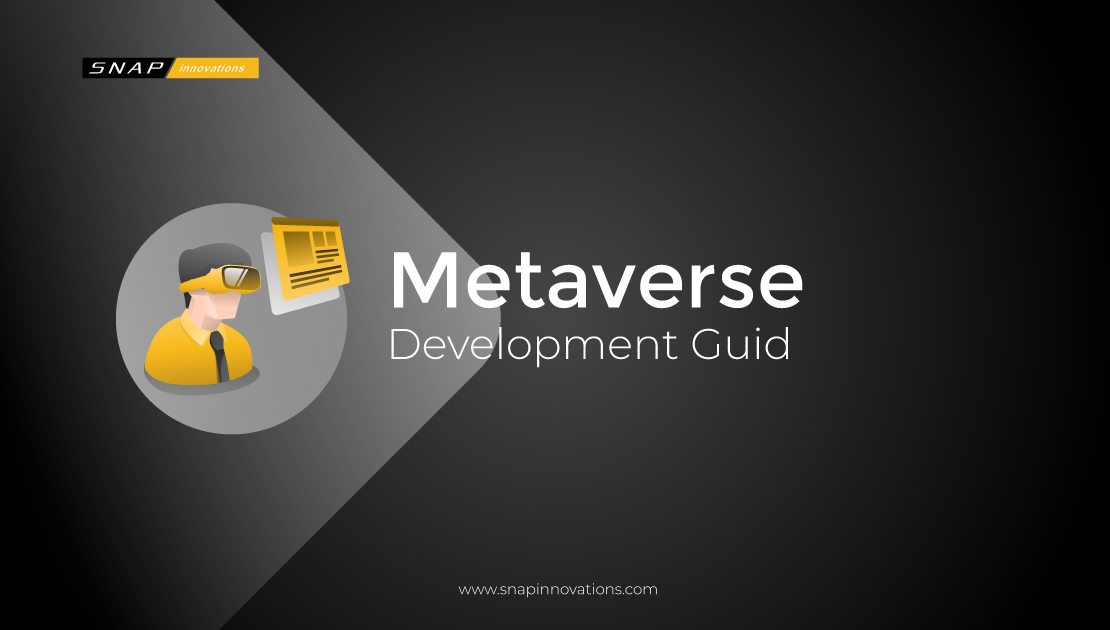Metaverse Development: All The Things You Kneed To Know

The term “Metaverse” might sound like something out of a sci-fi novel, but it’s rapidly becoming a reality. With advancements in technology, especially in virtual and augmented reality, the lines between the physical and digital worlds are blurring. This convergence is leading to the creation of a shared, virtual space that encompasses digital twins of the real world, virtual realities, and augmented realities. As developers and enthusiasts dive deep into Metaverse Development, there’s a palpable excitement about the endless opportunities it presents.
For businesses, individuals, and developers, the Metaverse offers a new realm of possibilities. Whether it’s creating virtual real estate, hosting digital concerts, or developing immersive educational platforms, the applications are limitless. But before we delve into the intricacies of Metaverse Development, let’s start by understanding its foundation – What exactly is the Metaverse?
What is Metaverse Development?
 The Metaverse, in its simplest form, is a collective virtual shared space created by converging virtually enhanced physical reality, augmented reality, and the internet. It’s like the internet but experienced in 3D, where users can interact with the environment and other users in real-time. Imagine a world where you can attend a concert, visit a museum, or even go to work, all from the comfort of your home, yet feeling as if you’re there in person.
The Metaverse, in its simplest form, is a collective virtual shared space created by converging virtually enhanced physical reality, augmented reality, and the internet. It’s like the internet but experienced in 3D, where users can interact with the environment and other users in real-time. Imagine a world where you can attend a concert, visit a museum, or even go to work, all from the comfort of your home, yet feeling as if you’re there in person.
The concept of the Metaverse isn’t new. It has been a popular theme in science fiction for decades, with movies like “Ready Player One” and novels like “Snow Crash” exploring the idea. However, with the current technological advancements, especially in VR and AR, the dream of a fully functional Metaverse is becoming a reality. Companies like Facebook, now Meta, are investing billions into making the Metaverse a part of our daily lives.
At its core, the Metaverse is about creating a space where the physical and digital worlds merge. It’s not just about gaming or social media; it’s about creating a holistic digital ecosystem. From education and work to entertainment and social interactions, the Metaverse will touch every aspect of our lives.
But why is there so much buzz around the Metaverse now? The answer lies in the convergence of various technologies. With faster internet speeds, better VR/AR devices, and advanced AI, we now have the tools to create a seamless and immersive Metaverse experience. As we continue to innovate, the boundaries of what’s possible in the Metaverse will only expand.
Read More: 7 Best Online Equity Trading Platforms (2023)
The Technology Behind the Metaverse
The Metaverse isn’t built on a single technology. Instead, it’s the culmination of several technological advancements working in tandem. Virtual Reality (VR) and Augmented Reality (AR) are at the forefront, providing the immersive experiences that the Metaverse promises. With VR, users can dive into entirely digital worlds, while AR overlays digital elements onto the real world.
Blockchain technology also plays a crucial role in the Metaverse. It provides the foundation for creating digital assets, like virtual real estate or digital art, that can be bought, sold, and owned just like physical assets. This concept of digital ownership is revolutionizing how we perceive value in the virtual world.
Artificial Intelligence (AI) and Machine Learning (ML) are the brains behind the Metaverse. They drive the interactions, behaviors, and dynamics of the virtual world, ensuring that every experience is unique and tailored to the user. From chatbots to virtual assistants, AI will be the driving force behind our interactions in the Metaverse.
Lastly, cloud computing provides the infrastructure needed to support the vast and complex Metaverse. It ensures that the virtual worlds are always accessible, scalable, and can handle millions of users simultaneously. Without the power of the cloud, the Metaverse as we envision it wouldn’t be possible.
Opportunities in the Metaverse
 The Metaverse is more than just a digital playground; it’s a hub of opportunities. For businesses, it offers a new platform to engage with customers, showcase products, and even conduct transactions. Imagine a virtual store where customers can try products before buying or a digital art gallery where artists can showcase their work to a global audience.
The Metaverse is more than just a digital playground; it’s a hub of opportunities. For businesses, it offers a new platform to engage with customers, showcase products, and even conduct transactions. Imagine a virtual store where customers can try products before buying or a digital art gallery where artists can showcase their work to a global audience.
Education is another sector that stands to benefit immensely from the Metaverse. Virtual classrooms, immersive educational experiences, and global collaboration are just some of the possibilities. Students from around the world can attend the same class, go on virtual field trips, or even learn by doing in a controlled virtual environment.
The entertainment industry is already tapping into the potential of the Metaverse. Virtual concerts, movie premieres, and gaming tournaments in the Metaverse are drawing millions of users. These events are not only entertaining but also offer a new revenue stream for artists and creators.
Real estate in the Metaverse is also booming. Virtual land, properties, and spaces are being bought and sold for real money. These virtual spaces can be developed, rented out, or used for various purposes, from hosting events to setting up businesses.
Lastly, the Metaverse is a social space. It offers a platform for people to connect, collaborate, and build communities. From virtual meetups to collaborative projects, the social aspect of the Metaverse will be one of its biggest draws.
Challenges in Metaverse Development
While the Metaverse holds immense promise, it’s not without its challenges.
1. Digital Divide
The Metaverse, while promising, poses a significant challenge in terms of accessibility. The primary concern here is the digital divide. Not everyone around the world has access to high-speed internet or the advanced hardware required to experience the Metaverse fully.
This disparity can lead to a significant portion of the global population being left out of this digital revolution. For the Metaverse to be truly global and inclusive, it’s crucial to address these accessibility issues and ensure that everyone, regardless of their geographical or economic situation, can be a part of it.
2. Security and Privacy
As users spend increasing amounts of time in the Metaverse, concerns about their digital security and privacy grow. Personal data, virtual assets, and digital identities are at risk if not properly secured.
Developers and platform providers must prioritize robust security measures to prevent data breaches, unauthorized access, and potential misuse of personal information. The challenge lies in creating a secure environment without compromising the user experience.
3. Standardization
The Metaverse is not a singular entity. Multiple companies and platforms are diving into Metaverse Development, each with its own set of rules, protocols, and user experiences. This diversity, while beneficial in promoting innovation, poses a risk of fragmentation.
Users might find it challenging to navigate different Metaverse platforms with varying standards. The challenge for developers and stakeholders is to establish a unified set of standards and protocols that ensure interoperability and a seamless user experience across different platforms.
4. Monetization and Economy
The Metaverse offers numerous opportunities for businesses, from virtual real estate to digital goods and services. However, the challenge lies in finding sustainable and user-friendly monetization models. How do businesses earn in the Metaverse without compromising the user experience? How do users trade, and what kind of economy will the Metaverse have? These are questions that developers and business leaders need to address to ensure the long-term success and viability of the Metaverse.
5. Ethical Implications
Beyond the technical and economic challenges, the Metaverse poses significant ethical questions. How will individuals be represented? What are the implications on mental health as users spend more time in virtual realities?
How do we ensure that the Metaverse promotes positive interactions and doesn’t become a breeding ground for negative behaviors? Developers, stakeholders, and ethicists need to collaborate proactively to address these concerns and ensure that the Metaverse evolves in a direction that’s beneficial for all its inhabitants.
The Future of the Metaverse
 The Metaverse development is still in its infancy, but its potential is undeniable. As technology continues to evolve, the Metaverse will become more immersive, interactive, and integrated into our daily lives. In the future, we might see a blending of the physical and digital worlds to an extent we can’t even imagine today.
The Metaverse development is still in its infancy, but its potential is undeniable. As technology continues to evolve, the Metaverse will become more immersive, interactive, and integrated into our daily lives. In the future, we might see a blending of the physical and digital worlds to an extent we can’t even imagine today.
One of the exciting prospects is the idea of a “Multiverse” – interconnected Metaverses with different themes, rules, and dynamics. Users might be able to hop from one universe to another, each offering a unique experience.
The role of AI in the Metaverse will also grow. Personalized AI assistants, smarter interactions, and even AI-driven narratives will become commonplace. These advancements will make the Metaverse experience more tailored and engaging for each user.
As the Metaverse becomes more mainstream, we’ll also see new professions and job roles emerge. From Metaverse architects to virtual event planners, the job market will adapt to the needs of this new digital frontier.
The integration of the Metaverse with the Internet of Things (IoT) is another exciting possibility. Imagine your smart devices interacting with your virtual avatar, or your virtual home mirroring your real-world home in real-time.
Lastly, the societal impact of the Metaverse will be profound. It will redefine how we socialize, work, learn, and entertain ourselves. While there will be challenges, the benefits and opportunities the Metaverse offers are too significant to ignore.
Also Read: What is OMS and How does it work?
Conclusion
The Metaverse is not just the next big thing in technology; it’s a paradigm shift in how we perceive and interact with the digital world. As we stand at the threshold of this new era, the possibilities are endless. From reshaping industries to creating new ones, the Metaverse will touch every aspect of our lives.
For developers, businesses, and individuals, now is the time to dive into Metaverse Development. Understanding its nuances, potential, and challenges will be crucial for those looking to thrive in this new digital frontier. As we embark on this exciting journey, one thing is clear – the Metaverse is set to redefine our digital experiences in ways we can’t even imagine yet.
So, whether you’re a developer, entrepreneur, or just a curious individual, the Metaverse beckons. It’s a world of endless possibilities, challenges, and opportunities. And as we step into this new realm, one thing is certain – the future is virtual, and it’s here to stay.
Disclaimer: The information provided by Snap Innovations in this article is intended for general informational purposes and does not reflect the company’s opinion. It is not intended as investment advice or recommendations. Readers are strongly advised to conduct their own thorough research and consult with a qualified financial advisor before making any financial decisions.
